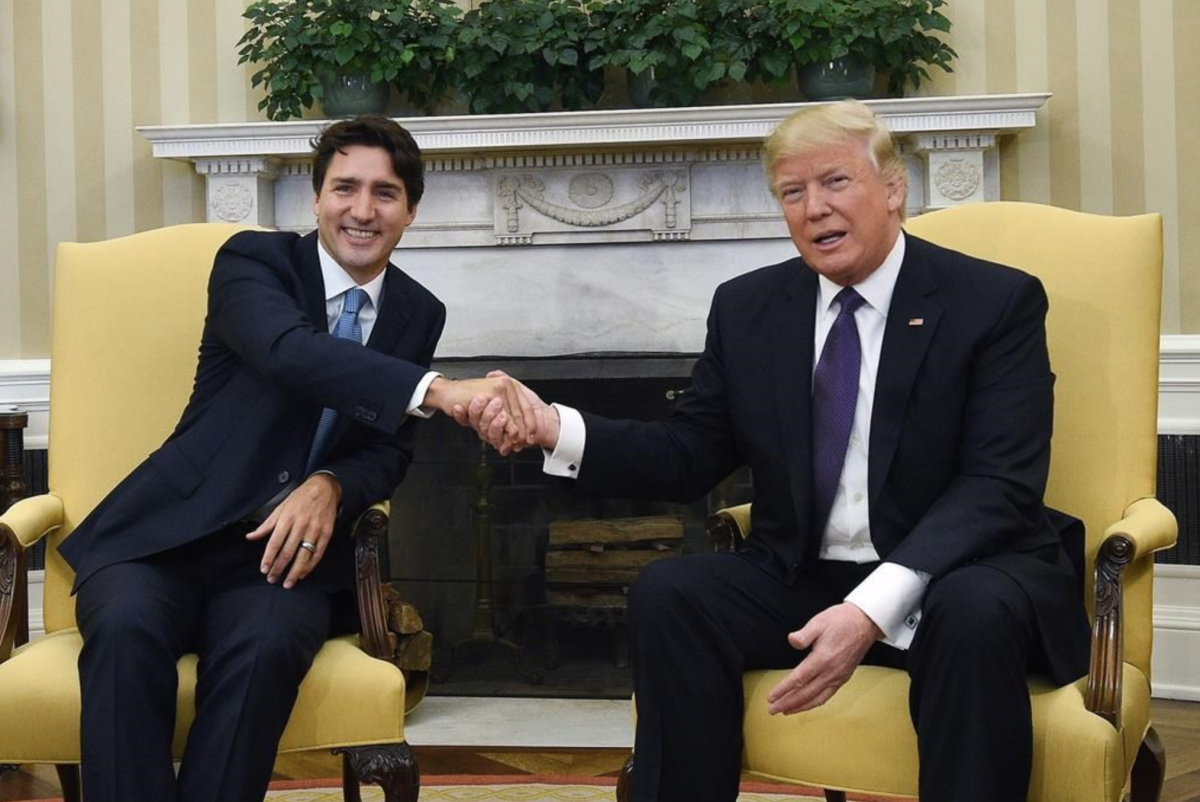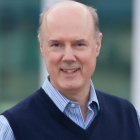Support strong Canadian climate journalism for 2025
Donald John Trump, the 70-year-old billionaire real estate mogul and abrasive television personality, the unbridled narcissist whose father described him as “a pretty rough fellow when he was small,” has ascended to the top of the most powerful nation on earth.
Trump is now “POTUS” – President of the United States which, somebody once noted, just happens to be the Latin word for “power.”
Unwittingly, he has become a great stimulus to a transformation of humanity that’s necessary for survival in the 21st century - humanity that is collaborative, cooperative, peaceful, creative, inclusive, compassionate and ecologically balanced.
He is a gift that keeps on giving.
Trump has long gloried in his ungovernability. When he introduced a reporter to the “board room” on the 26th floor of the Trump Tower on Fifth Avenue in 1983, and showed her the vast table that was its centrepiece, he commented: “This was supposed to be a board room, but what was the sense when there is only one member. We changed it to a conference room.”
Ungovernability is what will give him a place in history. Already terms like “Trumpish” and “Trump-ism” – implying actions that are arbitrary, capricious and unpredictably disruptive – have become part of today’s lexicon.
What Trump is not
The word “populist” has been used to describe Trump.
But he is not a populist.
As Eric Foner, an eminent historian of American democracy pointed out recently on CBC Radio, a populist rises from the masses and speaks on their behalf.
Trump is the favoured son of a wealthy man, who was given $1 million to start his career and join the 0.01% – whose goals, generally speaking, are in direct opposition to the needs of most Americans.
Trump is not a politician either, if you use a Wikipedia definition of politics as “the process of making decisions applying to all members of each group.”
On the contrary, Trump’s decisions are relentlessly focused on his own interests.
The U.S. president is part of a political system with “checks and balances” of the White House, the Senate and the House of Representatives. Because Republicans have a majority in Congress, he lives in the illusion that he has a free hand.
He pursues his own personal elitist, corporatist, racist, misogynist and ultranationalist agenda, believing that he’s entitled to enact whatever he wants.
He seems to have forgotten an important element of his country: the large majority of its citizens.
Most Americans are not elitist, corporatist, racist, misogynist or ultranationalist.
But this majority has in recent years been fragmented, perhaps trusting that “the American dream” in which “life, liberty and the pursuit of happiness” are “inalienable rights” would, by some miracle, just happen – and also perhaps feeling intimidated by the aggressive behaviour of conservative entities like the Tea Party.
Now, with Trump in the White House, the scales have fallen from their eyes. As with resistance to McCarthyism in the 1950s, many Americans recognize the threat this rogue president poses.
They are protesting in vast numbers, stepping out and speaking out and acting out, saying, in a myriad of different and increasingly well-organized ways, that they insist on true democracy in their country.
The issues that confront America also confront the rest of the world.
These are issues like global climate change, militarism and the arms trade, domination of global interactions and social discourse by colossal multinational corporations, lethal extremist groups and organizations, over consumption of the planet’s biological resources, pollution, and systemic injustice towards women, the poor, minorities, first peoples everywhere, and a range of gender affiliations.
Diminishing the moral authority of the United States
The increasingly visible and strenuous discord within the American polity is awakening vast numbers of people all around the world – people who have seen the United States of America as a symbol of freedom and opportunity.
At last, they are able to see that the U.S.A. is just another country.
The U.S.A. may be the home of the American Revolution, the world’s biggest army, and by certain measurements, the world’s largest economy. But with a figure like Trump in the Oval Office, the sacrosanct image of the United States as the home of democracy has been irrevocably altered.
This is not, however, a negative turn of events.
As the official moral gravitas of the U.S. governance system declines, it reflects on the governance systems of all nations. It exposes the fact that no government structure is infallible, because now it is obvious that even a nation with every perceived advantage can generate a frighteningly inadequate leader.
If the system has failed, and the leader is manifestly outrageous, then power is ipso facto transferred to ordinary people.
All over the world, Trump stimulates confusion and anxiety. But he is also provoking collective awareness and pushing the pace of transformation toward an inclusive, respectful and nonviolent human family.
Trump is not the real problem
When the U.S. president sows discord, encourages violence, and obfuscates the truth in his country and around the world, it is easy to fall into the trap of believing that he is the world’s biggest problem.
Nothing could be further from the truth. And if we become fixated on that notion, we will miss the gift that Trump is giving us.
He is showing us that the idea of an infallible model for us all to follow is a myth.
He is showing us that strength can never lie in one person in one office alone, but in the leavening effect of diverse points of view blended into a constantly evolving consensus, built on mutual respect and the enthusiastic and creative celebration of that very diversity.
This is his gift.
We must receive it, rejoice in it, multiply it and pass it on to our families, friends and neighbours.
How the transformation will proceed
First, the transformation must be nonviolent.
Since the Chipko Movement and Gandhi’s Salt March in India, as well as the actions of his students Martin Luther King and Nelson Mandela in more recent times, it has become clear that only non-violent social transformations lead to genuine change.
In his modest 1993 book “From Dictatorship to Democracy: A conceptual framework for liberation,” political scientist Gene Sharp outlines a panoply of processes essential to establishing true democracy, all of them nonviolent.
Second, the process of transformation must be systematic, organized and sustained.
Removing Trump from his role as president without changing the system that generated this anomalous situation would be remarkably unhelpful.
The role of dark money, the influence of corporate lobbyists, the plutocratic core of American politics, the blind belief in the “private sector” (and the concomitant rejection of public support systems), the bizarre distortions promulgated in the American media, and the entrenched unfairness towards women, African-Americans, Hispanic Americans, gays and lesbians and all other marginalized and disenfranchised sectors in American society – these are all elements of the American “system” that have made a Trump presidency possible.
They will not disappear in the face of gestures or symbolism; they can only be eliminated by an unbroken and coherent process of pragmatic and progressive rejuvenation of the rules under which American society conducts itself.
A brighter future
As events unfold in the US, they will influence what happens in the rest of the world. Somebody said once that “when the United States sneezes, the rest of the world catches a cold”.
The process whereby the “blight” of Donald Trump can be converted into the “gift” of the same person will be determined by the ordinary citizens of the United States, and by how vigorously, peacefully, sustainably and imaginatively they bring about change in their country.
If they aspire to and achieve the goals that people around the world also aspire to – goals like broadly distributed fairness and equity, successful cooperation among diverse groups and sectors, genuine action to mitigate climate change, and a full expression of compassion towards one another and towards other life forms – then those ordinary American citizens will once again offer inspiration to their fellow citizens around the world.
This second American Revolution, however, unlike the first, will require reaching out for reciprocal inspiration to all the peoples outside the United States who have similar aspirations, but have discovered an enormous variety of other approaches to achieving them. It will require sharing and collaboration that knows no national boundaries or cultural divides.
Humanity stands poised, literally, on the threshold of a potentially massive outpouring of positive and constructive energy.
If we choose to step into this new era, which we must, we will perforce thank Donald Trump for giving us – unbeknownst to himself – a firm nudge that moved us towards this brighter future.






Comments
Pollyanna
Good depiction of the opportunity to do what's needed. It's an exhortation, not a prediction. The opportunity is ours to take. The cost of letting it slip by would be too much. We have similar needs in Canada.
Good observation Warren, although President Trump has lots of rough edges it gives everyone opportunity to take a rasp and file off some burrs. Guaranteed his own children have had talks with Dad, when they have been embarrassed by some of his aberrations. Donald does have a heart for the financial health of the nation, hopefully not just for the 1% as the Trickle Down Economics has been proven wrong by the Panama Papers, Swiss Bank Accounts and Island Safe Refuges. We must keep heat to his feet to truly make "America Great Again".